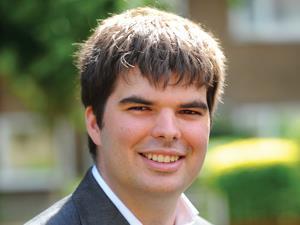Charles Harrison implores us to welcome new blood and ideas into the chemistry education community

Picture the scene: you enter a room dimly lit by flickering candles and approach a circle of high backed chairs shrouding their occupants in darkness. You are standing in the centre of a circle of candlelight when an ominous voice asks ‘what makes you worthy to join the chemistry education community?’
Perhaps this exaggeration is a little unrealistic, but it highlights an important question – when does a community become inaccessible or unfriendly to newcomers? As a member of the local organising committee for this year’s Variety in Chemistry Education/Physics Higher Education Conference (ViCEPHEC), I wondered how welcome people new to the community would feel.
I have been attending these conferences for several years, so they now fall into a familiar routine – catching up with old friends and colleagues from around the country and meeting the faces behind Twitter messages. Thinking about my first experience at ViCEPHEC, it was a different story. I was fortunate to be introduced by one of the ‘big players’ and inducted into the elite. Despite this, it took several years of hard work to really feel comfortable in those surroundings. What about those who are perhaps coming from an isolated academic outpost where they have not had the chance to meet anyone already in the community?
Although I can happily say I am involved in the thriving chemistry education community, I am concerned I may be a member of a chemistry education clique that I can’t see from the inside. Although everyone receives a warm welcome at the conference dinner, does that extend to being invited to speak at competitive sessions? I have had eight contributions accepted over the years, but have these blocked someone much more capable from outside the circle? Have we been unable to see the problems from our privileged positions?
community
noun
1 A group of people living in the same place or having a particular characteristic in common.
clique
noun
1 A small close-knit group of people who do not readily allow others to join them.
What’s in a conference?
The fundamental question is ‘why do we go to these conferences in the first place?’ For someone starting out in the field, it is an ideal opportunity to hear from established experts and meet others in the same boat as themselves. It is also a rare opportunity to engage in the sort of dissemination work that may be essential for promotion or to identify collaborators for future grant applications. Conferences are more than the social event of the year; they are potentially career making.
Personally, I was warmly welcomed into the community from the beginning. People seemed keen to introduce anyone new to the ‘experts’. In fact, I would say it was quite hard to avoid being sucked into the community; avoiding the post conference dinner pub trip (in favour of a good night’s sleep) has become something of an art form. So, if the community is fine, how about more academic matters?
The innovation factor
Often at conferences, we see the same names year after year. Sometimes I wonder if they are selected to speak on merit, or because they are ‘insiders’. The aim of a conference is to share best practice. Is it possible that innovation could it be stymied by the dominance of individuals pushing ideas that are simply rehashed from things they’ve done previously?
The field of chemistry education is no longer young, and increasingly has an accepted framework for how we do things. Speakers must be aware of this so that similar material is not presented as innovation several years in a row. By working from this baseline the community also gets to explore material in increasing depth without sacrificing innovation. This is of course a natural barrier to novices, which the established figures do not worry about.
Call to action
So how do we respond? Whether or not the concerns raised above really apply, there is a simple solution – get out there and talk to new people, make them feel welcome. Grab them during the coffee break or send them a tweet, it doesn’t matter whether you are a complete newbie or an old hand, just do it! Gone are the days of academic isolation, there is no reason now not to be involved.
Chemistry education in the UK is a booming field and yet still does not attract the recognition it deserves in the wider academic community. One way to maintain the momentum is to continue to push back boundaries and spread positive messages through the dissemination of sound, evidence-based innovations that support student learning and help to meet the challenges of 21st century education. The scope for doing this can be enhanced by bringing together the raw talent of the new blood and the experienced, battle-hardened stalwarts of the community.
I probably worry too much. A welcoming community may appear unwelcoming to a newcomer, but anxiety is normally dispelled instantly by a few proactive people working hard to make introductions. In my experience the chemistry education community is about as welcoming it gets. However, it is essential those at the top constantly ask themselves some of the questions I have posed here to avoid complacency and ensure the community continues to grow for years to come.
Charles Harrison has recently moved from the University of Southampton to the University of Exeter where he hopes to continue to combine chemistry safety and education









No comments yet